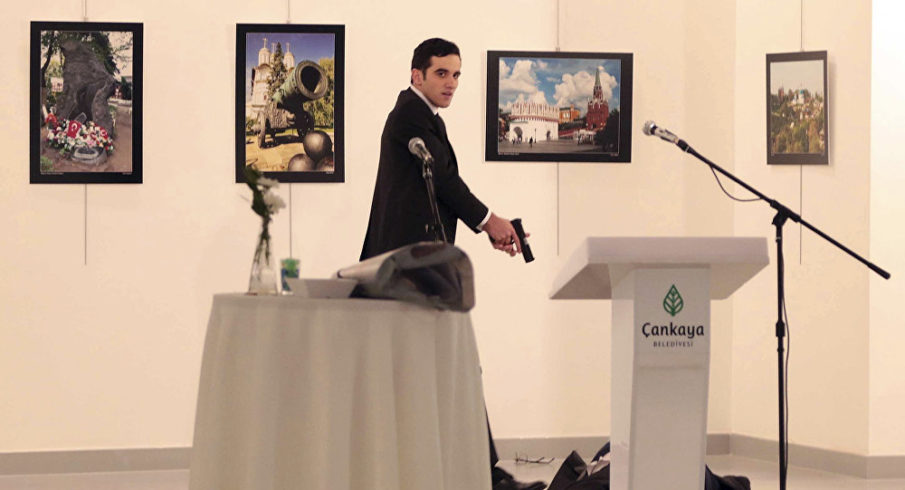Monday the Russian Ambassador to Turkey, Andrei Karlov, was shot and killed while speaking at the opening of a photo exhibit in Ankara, Turkey. The gunman, Mert Altintas, was a Turkish policeman, although there are conflicting reports as to whether he had been dismissed from his position prior to the attack. In any event, while Altintas was not part of the security on hand for the event at which the Ambassador was killed, Altintas did use his police ID to get past security without relinquishing his weapon and to gain proximity to the Ambassador before shooting him.
After gunning down the Ambassador, Altintas made a number of comments in both Arabic and Turkish suggesting strongly that his actions were in response to the Russian participation in the siege and destruction of the Syrian city of Aleppo. The Israeli military intelligence website, Debka, is reporting that Altintas was a member of the Al Nusra Front. Both Turkey and Russia are vowing retribution against whomever is responsible for the assassination.
The high-profile assassination of a senior Russian diplomat in broad daylight will likely have any number of ramifications. Some of those will not be felt or understood for some time. Let’s take a look, however, at some implications, which are already crystal clear.
First, the Russian decision to jump into the Syrian morass with both feet has had long-term negative consequences for Russia. A few years ago Russia was largely ignored by Sunni extremists other than those of Chechen origin. This is no longer true. Aleppo will be a rallying cry for jihadists many years from now, and the Russians are now going to find themselves targeted on a scale rivaling that of the United States and Western European states.
Some of the attacks on Russian targets will occur inside Russia. In these cases, Chechen separatists will likely play a key role. Many more attacks, however, will be directed at soft targets around the globe.
By implication we can expect that the Russians will attempt to get ahead of this wave of attacks by staging preemptive operations and that the Russians will respond vigorously after attacks occur. Readers of this site have a clear idea how difficult these kinds of operations are even for the United States military. For the Russians, who have an abysmal record when it comes to counterterrorism operations, think Beslan and the Moscow Theater Siege, these operations will prove impossible to carry out without causing a lot of collateral damage and killing a lot of innocent people.
Second, the Turkish security forces are a shadow of their former selves. When I served in Turkey many years ago, the Turkish intelligence service and national police owned the large cities and populated areas of the country. No longer. We regularly see major attacks now in Ankara and Istanbul.
Most worrisome, however, is that this attack was carried out by a policeman. This means not only that the security services have lost a step but that they are now penetrated. The implications of that are truly terrifying.
Nothing suggests that this downward trend in Turkish capabilities will be reversed anytime soon. This is the inevitable result of seemingly endless purges by President Erdogan. Much as Stalin gutted the Soviet officer corps in the years leading up to the Second World War, Erdogan has torn the heart out of the nation’s protectors in a witch hunt directed at “traitors” and “Gulenists.”
Finally, the Ankara attack, in combination with the other terrorist attacks we have seen recently in places like Jordan and Germany, tells us that the war against Sunni extremists is already shifting into a new phase. Even as we double down on the siege warfare being conducted in Syria and Iraq, the threat is morphing and expanding and adapting.
We have talked about a “terrorist diaspora” for months now. That diaspora has already occurred. We must be conscious, however, that the threat we are facing is not simply spreading in the sense of covering geographic space. It is also spreading in the sense of worming its way ever deeper into the fabric of the societies it has infected. That fact dramatically complicates the task of confronting and defeating it.
Already have an account? Sign In
Two ways to continue to read this article.
Subscribe
$1.99
every 4 weeks
- Unlimited access to all articles
- Support independent journalism
- Ad-free reading experience
Subscribe Now
Recurring Monthly. Cancel Anytime.


COMMENTS